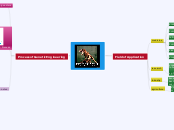przez Elia Khairil Annuar 9 lat temu
1444
Genetic Engineering

przez Elia Khairil Annuar 9 lat temu
1444

Więcej takich
Conjugation is the contact of bacteria that involves the exchange of DNA with a mating tube.
Electroporation is the use of an electric shock to momentarily open or disrupt cell walls.
Competent cell is a cell that is capable of taking up DNA
Process of introducing recombinant DNA into bacteria
Donor cell is the cell that provides the new DNA fragment for the recipient cell
recipient cell is the cell that is reviewing the 'new' DNA
uniting attaching two DNA fragments
for selection of positive transformants
for insertion of the gene of interest
A sequence of bases in a nucleic acid strand,that serves as a signal to start transcription